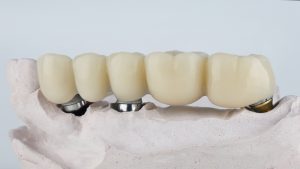Learn All About Dental Bridges From Your Local Kirkland Dentist
Like any dental procedure, understanding the potential risks and complications associated with dental bridges is a valuable part of the decision-making process. Being informed empowers you to care for your bridge effectively and recognize when to seek professional guidance. Dr. Roberts, a top dentist in Kirkland, believes in transparent communication, helping you navigate these considerations with clarity and peace of mind.
Ready to discuss your tooth replacement options with a dentist who prioritizes your understanding? Connect with Dentiste at (425) 284-0515. We welcome patients from Bellevue, Redmond, and Sammamish, offering a supportive and caring environment for all your dental needs.
Why Visit Dr. Roberts For Dental Restorations Near You?
Choosing Dr. Roberts for your dental restorations means establishing a lasting partnership in your oral health journey. Over time, Dr. Roberts becomes intimately familiar with the unique characteristics of your mouth and the performance of your restorations. This continuity of care allows for proactive monitoring, early detection of potential issues, and tailored advice for maintaining your restorations for years to come.
Ready to enhance your smile with durable, beautiful dental restorations? Call Dr. Roberts’ Kirkland dental office today at (425) 284-0515 to schedule your consultation!
 Possible Risks of Dental Bridges
Possible Risks of Dental Bridges
While dental bridges are a widely successful and reliable solution, it’s helpful to be aware of the potential risks, some of which are inherent to many dental restorations.
- Tooth Decay in Abutment Teeth: The teeth supporting the bridge (abutment teeth) are covered by crowns. However, if proper oral hygiene is not maintained, decay can still develop at the margins where the crown meets the natural tooth structure, particularly near the gum line. This can weaken the foundation of the bridge.
- Tooth Sensitivity: It’s common to experience some temporary sensitivity to hot or cold temperatures in the abutment teeth after the bridge is placed. This usually subsides as the teeth settle. Persistent or severe sensitivity warrants a call to Dr. Roberts.
- Gum Irritation or Inflammation: Inadequate cleaning around the bridge can lead to plaque buildup, causing the gums to become red, swollen, or bleed.
- Bite Problems: An improperly fitted bridge can affect your bite alignment. This can lead to discomfort when chewing, jaw pain, or even headaches.
- Nerve Damage: During the preparation of the abutment teeth, there is a very small risk of irritating the nerve within the tooth.
Possible Complications of Dental Bridges
Beyond the initial risks, complications can arise over time if the bridge is not properly cared for or due to other factors.
- Bridge Failure or Loosening: The cement holding the bridge in place can weaken over many years, or the abutment teeth themselves might experience issues, causing the bridge to become loose or even detach.
- Chipping or Fracture of the Bridge: Dental bridges, especially those with porcelain, can chip or fracture under excessive biting forces or if you bite down on something particularly hard. The extent of the damage determines whether repair or replacement is needed.
- Bone Loss Under the Pontic: Unlike a dental implant, a traditional bridge’s artificial tooth (pontic) does not stimulate the jawbone beneath it. Over time, this lack of stimulation can lead to bone resorption (shrinkage) in that area, which can sometimes create a visible gap under the bridge or affect the appearance of your gums.
- Difficulty Cleaning and Food Trapping: The design of a fixed bridge can create challenges for cleaning, especially under the pontic. If food particles and plaque are consistently trapped and not removed, it can increase the risk of decay on the abutment teeth and gum problems.
- Wear on Opposing Teeth: In some cases, if the bite on the new bridge is not perfectly balanced, it can cause excessive wear on the opposing natural teeth or other dental restorations.
Preventing Dental Bridge Complications
- Exceptional Oral Hygiene: This is the single most important factor. Brush your teeth and bridge at least twice a day using a soft-bristled toothbrush. Pay extra attention to the areas where the bridge meets your gums and the abutment teeth.
- Regular Dental Check-ups in Kirkland: Schedule and attend routine dental examinations and professional cleanings with Dr. Roberts. These appointments, typically every six months, allow Dr. Roberts to monitor the condition of your bridge, abutment teeth, and surrounding gums.
- Address Bruxism (Teeth Grinding): If you grind or clench your teeth, especially at night, discuss this with Dr. Roberts. The excessive forces generated by bruxism can put significant stress on your bridge and abutment teeth, leading to cracks, wear, or loosening. Dr. Roberts may recommend a custom-fitted night guard to protect your bridge and natural teeth.
- Promptly Address Any Concerns: Do not delay in contacting Dr. Roberts if you experience any unusual symptoms such as persistent pain, sensitivity, a feeling that your bridge is loose, gum swelling, or difficulty chewing. Addressing issues early can often prevent them from escalating and requiring more complex or costly interventions.
By understanding these aspects and actively participating in your bridge’s care, you are setting yourself up for many years of a healthy, functional, and beautiful smile. Dr. Roberts and her team are dedicated to supporting you every step of the way. Call (425) 284-0515 to learn more.
Frequently Asked Questions
While dental bridges are generally very successful, like any medical or dental procedure, there are potential risks and complications. Many of these can be avoided or managed with good oral hygiene and regular dental check-ups with Dr. Roberts.
Yes, the natural teeth (abutment teeth) supporting the bridge are still susceptible to decay, especially at the gum line where the bridge meets the tooth. Meticulous brushing and flossing, particularly with aids like floss threaders, are essential to prevent this.
If your dental bridge feels loose or comes off, it is important to contact Dr. Roberts immediately. Do not try to re-cement it yourself. Prompt attention can often save the bridge and prevent further damage to the supporting teeth.
The best ways to minimize risks are maintaining excellent oral hygiene (brushing twice daily, flossing every day), avoiding chewing on very hard or sticky foods, and attending all your recommended routine dental check-ups and cleanings with Dr. Roberts.
Your Path to a Stable Smile Starts at Our Dental Clinic Near You
At our local Kirkland dental office, we believe in empowering our patients with clear, compassionate information, addressing every concern with attentiveness and care. You deserve to restore your smile with confidence, knowing you have a dedicated team supporting you every step of the way.
From Bellevue to Redmond and Sammamish, we invite you to discover a dental experience where your well-being is always the priority. Don’t let questions hold you back from the smile you envision. Call us today at (425) 284-0515 to schedule your consultation.
